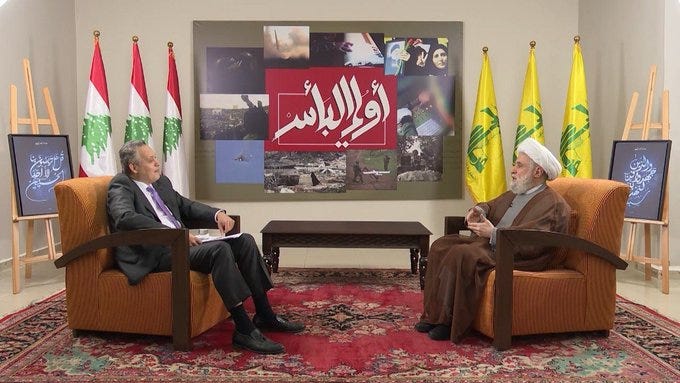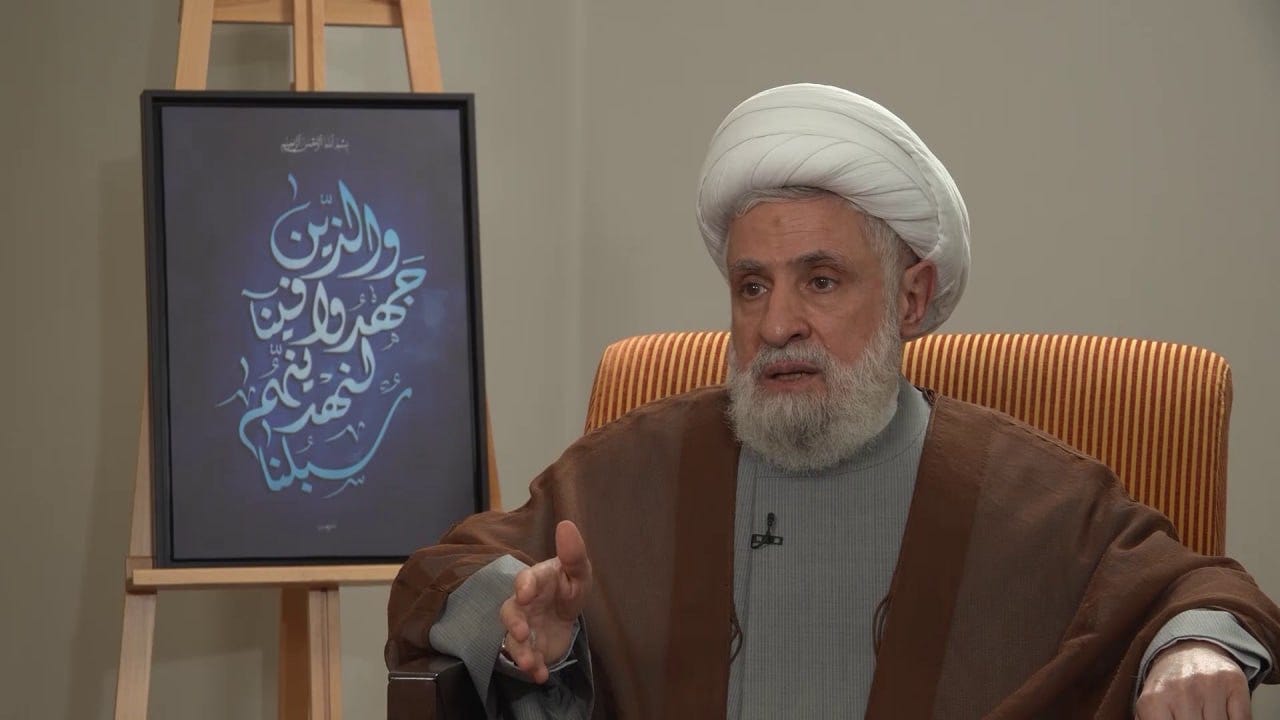Sheikh Qassem: Resistance Is the Essence of Hezbollah, the Guarantee of Lebanon’s Dignity
Marking one year of leadership, Hezbollah Secretary-General outlines the movement’s unwavering principles, collective leadership, and enduring commitment to defend Lebanon against Israeli&US Agression
Lebanon, PUREWILAYAH.COM - Hezbollah Secretary-General Sheikh Naim Qassem affirmed that the movement represents a comprehensive strategic project built upon a clear vision for addressing the concerns of the people—social, economic, and political—while resisting occupation and aggression.
In his exclusive interview with Al-Manar TV, Sheikh Qassem emphasized that resistance for Hezbollah is not a temporary tactic or limited military option but a way of life deeply ingrained in the movement’s identity.
“Resistance is a comprehensive way of life integral to the essence of the movement. We do not grow weary. The party’s path is strong and steadfast, and surrender is not an option simply because of fatigue,” His Eminence stated.
Spirit of Sacrifice and Collective Leadership
Sheikh Qassem praised Hezbollah’s members for embodying a spirit of sacrifice and resilience, from the fighters on the front lines to the families who have given everything for the cause.
“Every individual in Hezbollah carries this self-sacrificing spirit, confronting difficulties and giving everything to achieve the objective, no matter how challenging the path,” he said.
He underlined that Hezbollah’s leadership operates on a collective and institutional foundation, in close coordination with the consultative council and the wider resistance community.
“I am not alone. The party has an integrated collective leadership at all levels, which is the source of its strength and success,” His Eminence affirmed.
Presence on the Battlefield: Leadership by Example
Responding to questions about his role during the recent war, Sheikh Qassem made clear his refusal to leave Lebanon or relocate to Iran, stressing that leadership requires presence alongside the fighters.
He underscored that the commander’s place is on the battlefield, guiding and enduring with the people. His Eminence explained that effective leadership cannot be separated from the ground reality where the resistance confronts aggression.
The “Mighty Warriors Battle”: A Lebanese Achievement
Addressing the “Mighty Warriors Battle”, Sheikh Qassem revealed that its management was entirely collective and Lebanese, coordinated among Hezbollah’s leadership, consultative council, and field commanders.
He praised the role of Ayatullah Sayyed Ali Khamenei, Leader of the Islamic Revolution in Iran, who provided moral and strategic guidance while respecting Lebanon’s independent decision-making.
“All decisions and actions were fully Lebanese,” Sheikh Qassem said, rejecting Western and Israeli claims that Iran commanded Hezbollah’s operations.
He described the battle as a decisive moment of steadfastness, in which Hezbollah’s fighters stopped the advance of over 75,000 Israeli soldiers, preventing the enemy from reaching the Litani River or threatening Beirut.
A Living Model of Resistance
Sheikh Qassem highlighted that Hezbollah’s “Al-Rodwan Force” remains a vital part of the resistance’s overall strength, sharing the same sacrifices while maintaining operational effectiveness.
He pointed to the massive public turnout at the funerals of martyrs and the work of youth scouts as evidence of the movement’s deep roots in Lebanese society.
“These are living proof of public will and the foundation for Lebanon’s future. The continuity of resistance rests on faith and determination,” he said.
Addressing the fighters directly, Sheikh Qassem declared:
“You are the ones who give us momentum and drive. I am part of you, and I wish to stand among you as a soldier on the front lines, at the heart of the battlefield.”
People: The Foundation of Resistance
Sheikh Qassem reaffirmed that the people are the cornerstone of Hezbollah’s strength, surpassing even leaders or fighters in importance.
“With you, the path becomes stronger. You are an inseparable part of the resistance and its victories,” His Eminence said.
He stressed that Hezbollah’s role is defensive, confronting an enemy that seeks annihilation and domination. Refusing to confront such aggression, he warned, would only enable further expansion and oppression.
“We do not lead our people toward poor choices, but toward great decisions that preserve dignity and secure a better future,” he stated.
Unbreakable Bonds with Speaker Nabih Berri
Sheikh Qassem highlighted the strong alliance and coordination between Hezbollah and Parliament Speaker Nabih Berri, especially during periods of Israeli aggression. Both sides maintain constant consultations to protect Lebanon’s unity and national interests.
“Our principles are aligned, and this requires us to continue working together as one to protect Lebanon,” His Eminence affirmed.
Resistance: Defense, Not War
Sheikh Qassem reiterated that resistance is a firm and irreversible choice, independent of resources or circumstances.
“We declare to the whole world that we will remain a resistance force even if all we have left are our fingernails or a stick, and we will not stop,” he said.
He stressed that Hezbollah’s mission is defense—not provocation or aggression.
“We have no decision to start war, but if a confrontation is imposed on us, we will not allow the Israeli enemy to pass. We will fight to the last breath,” he vowed.
His Eminence condemned the United States and Israel for creating Lebanon’s crises and pushing the region toward instability, while Hezbollah has honored its commitments to the Lebanese state for ten months without launching a single strike—proving that resistance is disciplined, not reckless.
Deterrence and National Coordination
Discussing deterrence, Sheikh Qassem said that while deterrent power may not entirely prevent war, it ensures the Zionist enemy cannot achieve its goals.
“If Israel considers launching a large-scale war, it will achieve nothing, and they should know this in advance,” he declared.
He urged the Lebanese state to fulfill its national duties, noting that Hezbollah had handed over responsibility for sovereignty and defense after the ceasefire agreement.
“Ten months have passed since the agreement, and the state has not moved. It must take responsibility. This is a public test for everyone,” His Eminence warned.
Legitimacy of Arms and the National Duty to Defend
Sheikh Qassem reaffirmed that Hezbollah’s weapons are legitimate—a national tool for defense and liberation, not aggression.
“Our defense extends beyond Lebanon to Palestine, Syria, and Egypt, forming a united front against an enemy whose ambitions exceed all geographic boundaries,” he explained.
He rejected calls to confine the resistance to southern Lebanon, stressing that Israel remains an existential threat with ambitions to subjugate the entire region through military, political, and social warfare.
“Resistance is not defined by geography nor measured by power balances with the enemy. It is a decision, sovereignty, and national will,” His Eminence stated.
“Even if only one man remains, resistance will continue until the end.”
Reconstruction: A National Responsibility
Concluding the interview, Sheikh Qassem emphasized that reconstruction is both a humanitarian and national duty, calling on the Lebanese government to act decisively.
He warned that Israel’s goal is to prevent displaced families from returning to their homes, aiming to weaken the social foundations of resistance.
“The government must act decisively to counter this scheme, because this hostile path will not produce results,” he said.
Support for Elections and Sovereignty
Sheikh Qassem reaffirmed Hezbollah’s support for timely parliamentary elections, stating that delays serve only narrow political interests.
“We support elections to maintain the regular functioning of public affairs and to demonstrate the party’s broad representation in Parliament,” he said.
He further stressed that Lebanese law alone governs national affairs, rejecting any foreign or American interference in the country’s internal matters.
“National laws are the sole reference in dealings with the population, and the independence of Lebanese decision-making must be preserved,” Sheikh Qassem concluded. (PW)



